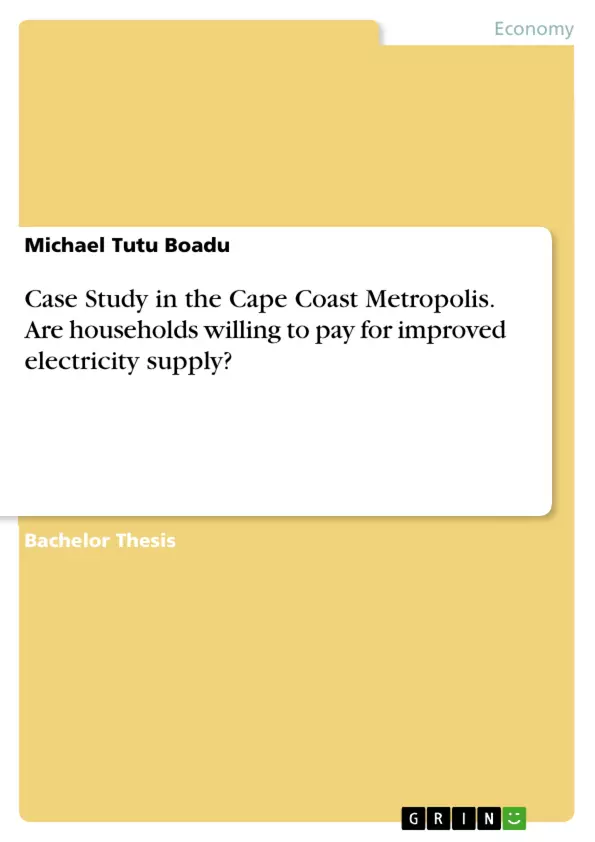The main objective of this study was to find out whether households are willing to pay for improved electricity supply in Ghana: Cape coast Metropolis. The study adopted survey research and emphasized the Contingency Valuation Method. Theoretical and empirical literature relevant to the study was reviewed. The research work also employed primary data where 200 household heads were sampled and they were the main respondents for the study.
The analysis of the data was made possible by the use of SPSS and STATA software packages. Also, the logit regression model was used in assessing the significance of the explanatory variables in relation to Willingness to Pay which is the dependent variable in this study. Findings from the study showed that out of the 200 respondents interviewed, 174 respondents representing 87 percent are willing to pay for the improvement in electricity supply, while the remaining 26 respondents representing 13 percent specified that they are not willing to pay for the improvement in electricity supply. In addition, factors such as the households income, marital status, education, alternative power source and household size of consumers are important variables that significantly affect Willingness to Pay (WTP) in this study.
Inhaltsverzeichnis (Table of Contents)
- CHAPTER ONE
- INTRODUCTION
- BACKGROUND TO THE STUDY
- PROBLEM STATEMENTS
- OBJECTIVES OF THE STUDY
- STATEMENT OF HYPOTHESIS
- JUSTIFICATION OF THE STUDY
- SCOPE OF THE STUDY
- ORGANIZATION OF THE STUDY
- CHAPTER TWO
- LITERATURE REVIEW
- INTRODUCTION
- THEORETICAL REVIEW
- NON MARKET VALUATION
- METHODS FOR NON MARKET VALUATION
Zielsetzung und Themenschwerpunkte (Objectives and Key Themes)
This dissertation aims to explore households' willingness-to-pay for improved electricity supply in Ghana, focusing on the Cape Coast Metropolis. It utilizes the Contingency Valuation Method and analyzes data from a survey of 200 household heads.
- Assessing households' willingness-to-pay for improved electricity supply.
- Identifying key factors influencing willingness-to-pay.
- Examining the significance of variables such as income, marital status, education, alternative power sources, and household size.
- Applying the logit regression model to analyze the relationship between explanatory variables and willingness-to-pay.
- Contributing to understanding electricity service demand and policy implications in Ghana.
Zusammenfassung der Kapitel (Chapter Summaries)
Chapter One provides an introduction to the study, outlining its background, problem statements, objectives, hypothesis, justification, scope, and organization.
Chapter Two presents a comprehensive literature review, exploring theoretical frameworks and existing research on non-market valuation, including various methods used for this purpose.
Schlüsselwörter (Keywords)
This dissertation focuses on the key concepts of willingness-to-pay, electricity supply, non-market valuation, contingency valuation method, household characteristics, and logit regression model, all within the context of the Cape Coast Metropolis in Ghana.
Frequently Asked Questions
What is the "Willingness to Pay" (WTP) concept?
WTP measures the maximum amount of money a consumer is willing to spend for a certain improvement in service, in this case, a more reliable electricity supply.
How many households in Cape Coast are willing to pay more for better electricity?
According to the study, 87 percent of the 200 sampled households expressed a willingness to pay for improved electricity supply.
What is the Contingency Valuation Method?
It is a survey-based economic technique used to estimate the value of non-market goods by asking people directly how much they would pay for a specific benefit.
Which factors influence the willingness to pay?
Significant factors include household income, education level, marital status, household size, and the availability of alternative power sources.
What statistical models were used in the analysis?
The researchers used logit regression models and software packages like SPSS and STATA to assess the data.
- Arbeit zitieren
- Michael Tutu Boadu (Autor:in), 2016, Case Study in the Cape Coast Metropolis. Are households willing to pay for improved electricity supply?, München, GRIN Verlag, https://www.grin.com/document/494455



